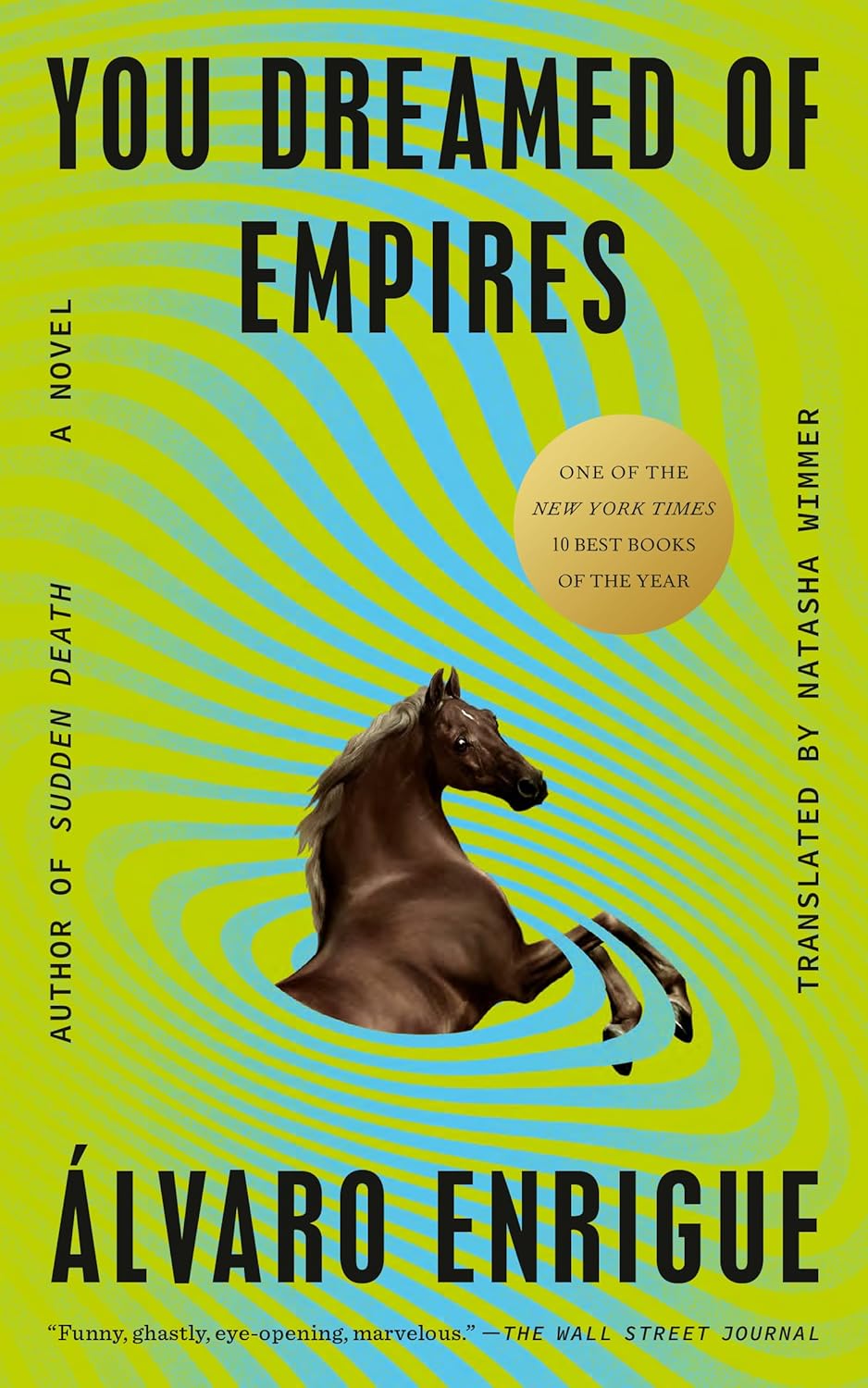
You Dreamed of Empires
Cortés’s Dream
by Álvaro EnrigueThis chapter centers on the pivotal encounter between Hernán Cortés and Moctezuma, the Aztec emperor, in the blue throne room of Tenochtitlan. The scene is laden with tension, as Cortés and his men are forced to adhere to strict ceremonial protocols—removing weapons, veiling their faces, and maintaining silence until addressed. Moctezuma, though seemingly hospitable, exudes an air of controlled power, while Cortés struggles between arrogance and nervousness. The cultural divide is stark: Cortés, dressed in European finery, contrasts with the barefoot, feathered nobility of the Aztec court. The translators, Malinalli (La Malinche) and Aguilar, mediate the exchange, but misunderstandings persist, foreshadowing the inevitable clash between the two empires.
The chapter takes a surreal turn when Moctezuma offers Cortés a hallucinogenic cactus, the “cactus-of-tongues,” promising it will allow them to communicate without translators. Under its influence, Cortés experiences a prophetic vision of the Spanish conquest—Tenochtitlan’s fall, the death of Moctezuma, the rise of New Spain, and centuries of colonial rule. The vision blends historical events with dreamlike distortions: his men turn into animals, Moctezuma transforms into an eagle-like deity, and Cortés sees himself as both conqueror and pawn in a larger cosmic drama. The sequence underscores the novel’s magical realism, blurring the line between fate and hallucination, while hinting at the cyclical nature of power and destruction.
Upon waking, Cortés is convinced of his inevitable triumph, believing his vision confirms Spanish dominance. However, reality subverts his expectations. Moctezuma, now speaking in Nahuatl (unintelligible to Cortés), summons his brother Cuitlahuac, who brutally kills Cortés by breaking his spine—a symbolic reversal of historical events. Meanwhile, Moctezuma orders his warriors to prepare for war, signaling the Aztec resistance. The chapter’s abrupt shift from dream to violent reality critiques the arrogance of colonial narratives, suggesting that history could have unfolded differently. The recurring motif of the “ant” (a silent but inevitable force) reinforces the theme that empires, no matter how grand, are subject to unseen forces beyond their control.
The chapter closes with the Aztec empire mobilizing for battle, while Cortés’s broken body lies discarded. Moctezuma, adjusting his crooked tiara, walks away, embodying the fragility of power. The narrative then jumps forward in time, briefly summarizing the fall of Tenochtitlan, the spread of smallpox, and the eventual establishment of New Spain—events that Cortés foresaw but failed to truly understand. The acknowledgments reveal the novel’s literary influences, from Borges to Calderón, framing the story as a meditation on history’s fluidity and the illusions of empire. Ultimately, this chapter serves as both a climax and a deconstruction of conquest myths, leaving the reader to question whether Cortés’s dream was prophecy or delusion.
FAQs
- 1. Historical Reinterpretation
- Q1: Did Cortés truly hallucinate the future conquest?
- Answer: No—this is a fictional device. While Cortés historically survived the encounter, Enrigue subverts the colonial narrative by having him envision Spanish victory only to be killed by the Aztecs in reality. The hallucinogenic cactus-of-tongues symbolizes competing claims to historical truth.
- Q2: Why does Moctezuma insist on speaking "Greek" (Xleek)?
- Answer: A satirical jab at European cultural hegemony. By fictionalizing Greek as an untranslatable "sacred language" (Xleek), Enrigue exposes colonialism’s linguistic arrogance—the conqueror’s tongue is rendered meaningless.
- 2. Cultural Confrontation
- Q3: Why does Malinalli say, "Let him know how it feels to be fucked in the ass"?
- Answer: This crude Spanish line (delivered untranslated) reveals her covert rebellion. As the translator, she withholds Moctezuma’s intent, luring Cortés into the hallucinogenic trap—a metaphor for colonial exploitation boomeranging.
- Q4: Why must the Spaniards disarm before the meeting?
- Answer: Historically documented, but Enrigue heightens the irony. Weapons symbolize colonial violence; by enforcing ritual submission (bare feet, veiled faces), Moctezuma reverses power dynamics, exposing European "civility" as performative.
- 3. Surreal Symbolism
- Q5: Why do Cortés’s men transform into animals?
- Answer: Magic realism as critique. Oviedo becoming a suckling pig mirrors conquistador greed; Moctezuma’s eagle nagual (spirit form) embodies Indigenous sovereignty. Cortés, "dreaming he dreams," becomes history’s pawn, not hero.
Quotes
- 1. Power as Illusion
- "The ant may not talk, but in the end he always shows the way."
- – Moctezuma
- Analysis: The ant—small, silent, inevitable—represents Indigenous resilience that outlasts empires. Foreshadows the Aztec revolt in the chapter’s climax.
- 2. Language as Weapon
- "We speak Xleek here on very important occasions... you and I can speak it, if you want."
- – Moctezuma
- Analysis: Xleek (fake Greek) parodies colonial "civilizing" rhetoric. The untranslatable language becomes a tool to disorient Cortés, mocking Eurocentric hierarchies.
- 3. History’s Irony
- "Cortés dreamed of gold, but the dream dreamed of Cortés."
- – Narrator
- Analysis: A meta-commentary. Cortés’s hallucination of conquest (gold, New Spain) is revealed as history’s dream—one where he’s merely a disposable actor.
- 4. Religious Absurdity
- "He’s a god who feeds his flesh to the dogs, like our Xipe."
- – Moctezuma comparing Jesus to Xipe Totec
- Analysis: Darkly comic. The Aztec flaying god (Xipe) mirrors Christ’s sacrifice, reducing theological differences to grotesque equivalence.
- 5. Violence & Reversal
- "Now, Cuitlahuac."
- – Moctezuma’s final order
- Analysis: The chapter’s chilling last words. Cortés’s spine is snapped by Moctezuma’s brother—a literal breaking of colonial momentum, rewriting history’s "inevitability."
